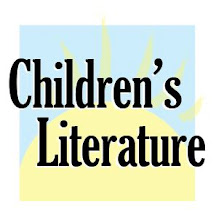The following is the first in a six part series written by Children's Literature President Marilyn Courtot that we posted back in 2009. Aimed at reviewers and writers, we will be running a new part every month.
Basic Construction and Illustrations
When evaluating a book for a child, there are a lot of characteristics to keep in mind. But lest you feel overwhelmed, remember that if you have been reading books, especially children’s books, you have probably developed an innate ability to select the good ones. You just may not realize what influences you and why. This, first in a series of columns, will address the features of a good book.
Let’s look at the basic construction of a book. Consider the quality of the fabrication—will it hold up to repeated handling and reading? Look in particular at the binding and cover construction. If the slip jacket is removed, will the cover still have appeal? Is the paper of good quality, or does it tear easily? Look at the book’s size and shape. If the book is for toddlers then keep it small for little hands. Oversized books are usually not appropriate for those under nine—they are just too big and too heavy.
Next, look at the illustrations. Are they clearly reproduced? Are the color registration and clarity acceptable? Although black-and-white helps babies clearly distinguish objects, color is very important for older kids. Colors do not need to be vibrant or garish to appeal to children; studies have shown that pastels are soothing and can encourage learning.
Also, are the illustrations appropriate to the story or text? Do they enhance and exemplify the text, or do they head off in an entirely new direction. Author/illustrator Chris Manson commented that “the children’s book market is really the best place in the publishing industry for full color art. Sometimes it blows away the story.” He believes that illustrations need to be in balance with the story. Illustrations should make the story bigger, but not different.
Marilyn Courtot
Publisher and Editor
CLCD
Thursday, May 31, 2012
Monday, May 21, 2012
Summer Audiobooks
The New York
Times
Book Review section from May 20th featured an article by Judith
Shulevitz, “Let’s
Go Reading in the Car” that included the following list of recommended audiobooks
to check out this summer. Read reviews for these titles with CLCD.
For Ages 4 and
Up:
D’Aulaires’ Book
of Greek Myths
Read
by Paul Newman, Sidney Poitier, Kathleen Turner, and Matthew Broderick
The
“Gooney Bird” series by Lois Lowry
Read
by Lee Adams
The
“Great Brain” series by John D. Fitzgerald
Read
by Ron McLarty
The
“Judy Moody” and “Stink” series by Megan McDonald
Read
by Barbara Rosenblat
Toys Go Out by Emily
Jenkins
Read
by Melanie Martinez
For Ages 8 and
Up:
The
“Fudge” series by Judy Blume
Read
by the author
Misty of
Chincoteague
by Marguerite Henry
Read
by Edward Herrmann
Shiloh by Phyllis
Reynolds Naylor
Read
by Peter MacNicol
The Trumpet of
the Swan
by E.B. White
Read
by the author
For Ages 10 and
Up:
Bloomability by Sharon
Creech
Read
by Mandy Siegfried
Flush by Carl Hiaasen
Read
by Michael Welch
The
“Joey Pigza” series by Jack Gantos
Read
by the author
Maniac Magee by Jerry
Spinelli
Read
by S. Epatha Merkerson
Moon Over
Manifest
by Clare Vanderpool
Read
by Jenna Lamia, Cassandra Campbell, and Kirby Heyborne
Friday, May 11, 2012
Sudipta Bardhan-Quallen
 Sudipta Bardhan-Quallen is a graduate of the California Institute of Technology
with a degree in biology. She never thought that she would grow up to
become a writer; it wasn’t until she had her two children that she took time
off from being a Ph.D. candidate to pursue a career in writing. Sudipta had
her first story published in 2003 in the magazine Highlights for Children. From there, Sudipta branched out into nonfiction,
including books on science and biographies. Her most recent book is Half-pint Pete the Pirate, illustrated
by Geraldo
Valério.
Sudipta Bardhan-Quallen is a graduate of the California Institute of Technology
with a degree in biology. She never thought that she would grow up to
become a writer; it wasn’t until she had her two children that she took time
off from being a Ph.D. candidate to pursue a career in writing. Sudipta had
her first story published in 2003 in the magazine Highlights for Children. From there, Sudipta branched out into nonfiction,
including books on science and biographies. Her most recent book is Half-pint Pete the Pirate, illustrated
by Geraldo
Valério.
Sudipta visits schools to share her stories and experience,
and teaches writing to children and adults. She lives in New Jersey with her
family (now comprised of three children, with the addition of son Sawyer in
2006) and an imaginary pony named Penny.
To have Sudipta visit your school or organization email
marilyn@childrenslit.com
Subscribe to:
Comments (Atom)




